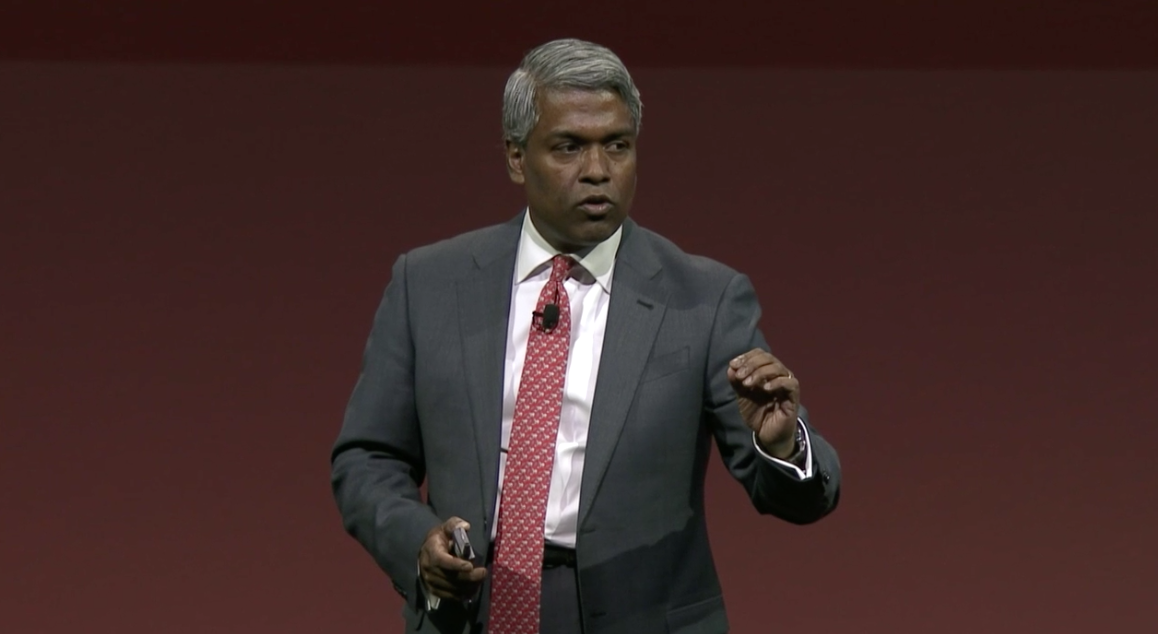 CLOUD
CLOUD
 CLOUD
CLOUD
 CLOUD
CLOUD
When it comes to cloud computing applications, Oracle Corp. is all about self: self-repairing, self-securing and self-driving.
After rolling out its Data Warehouse Cloud in March, Oracle doubled down today on its autonomous capabilities with the general availability of built-in artificial intelligence and machine learning algorithms for its analytics, integration and visual builder cloud services.
The extension of new autonomous capabilities across its platform-as-a-service portfolio highlights the company’s interest in staking out an position in offering autonomous services for enterprise applications for the database market. This point was driven home by Oracle Chief Executive Mark Hurd during the company’s media day at its headquarters in Redwood Shores, California.
“We actually built a brand-new set of apps,” Hurd said. “That’s very different from what anybody else did. We’re taking a lot of market share in applications overall.”
In addition to the release of autonomous capabilities across its PaaS offerings, Oracle also announced new customer support for its Fusion software-as-a-service applications, which include enterprise resource planning, supply chain and manufacturing. The new platinum-level support services for Fusion cloud applications will be provided to SaaS customers at no extra cost.
“We’re bringing what was a fee service into a standard service,” Hurd said. “Most of our competitors sell [service] in bundles you have to buy for three years. We don’t want to do any of that.”
Although the new autonomous offerings and service plan were the focus of Oracle’s message on Monday, discussion by a number of company executives provided a few details that shed light on how much progress an “all-in” autonomous strategy is making and what might be in store down the line. When Oracle announced availability for its Autonomous Data Warehouse Cloud in March, it promoted query performance with no tuning as a key feature, boasting that it would guarantee the same workload at half the cost of Amazon Web Services Inc.’s Redshift.
In discussion on Monday, Çetin Özbütün, senior vice president of data warehouse and big data technologies at Oracle, said the Autonomous Data Warehouse Cloud was indeed delivering performance seven to 14 times faster than Redshift. This benchmark was confirmed later in the morning during a discussion with Pat Sullivan, a managing director for Accenture.
“You have to vacuum your data [with Redshift], collect your optimizer statistics and consistently tune,” Özbütün said in his explanation of the difference between the two database services.
Oracle executives also offered optimism that the company’s cloud initiatives were gaining traction in the competitive enterprise market. According to Thomas Kurian (pictured), Oracle’s president of product development, nine of the company’s 10 largest customers are now running at least one pillar of the Oracle Cloud, which could be ERP, human resource software or sales and marketing functions.
“That’s a big step for us even compared to one year ago,” Kurian said.
Oracle’s head of product development also provided a glimpse into other directions the company is pursuing which could bear fruit down the line. One of these areas is blockchain.
Kurian revealed that blockchain platform services would be released later this month and applications will follow in June. The company is currently working with clients such as Banco de Chile to use the blockchain for inter-bank transactions and the government of Nigeria for a distributed ledger application that will track import duties, according to Kurian.
Oracle also has been active in fitting two recent acquisitions more fully into its overall cloud strategy. In 2016, the company acquired Dyn, a managed DNS provider for optimizing Internet applications. It followed that acquisition with the purchase of Zenedge, a cloud-based network security firm, earlier this year.
To compete against big cloud service providers such as AWS and Microsoft Azure, Oracle will have to play in the network perimeter where services such as web proxies and firewalls are deployed. “Our goal with the Zenedge/Dyn portfolio is to constitute the intelligent edge to the cloud,” Kurian said.
Whether Oracle’s cloud strategy is successful will depend on its ability to leverage an existing customer base and add new clients. Today the company also released some recent customer wins and business expansion. The list included T-Mobile US Inc., Emirates Flight Catering and Gonzaga University.
“We want to be the best at offering customers choices that none can match,” said Catherine Blackmore, Oracle’s group vice president for customer success. “Our customers’ business is open 24 by 7 and so are we.”
Support our mission to keep content open and free by engaging with theCUBE community. Join theCUBE’s Alumni Trust Network, where technology leaders connect, share intelligence and create opportunities.
Founded by tech visionaries John Furrier and Dave Vellante, SiliconANGLE Media has built a dynamic ecosystem of industry-leading digital media brands that reach 15+ million elite tech professionals. Our new proprietary theCUBE AI Video Cloud is breaking ground in audience interaction, leveraging theCUBEai.com neural network to help technology companies make data-driven decisions and stay at the forefront of industry conversations.